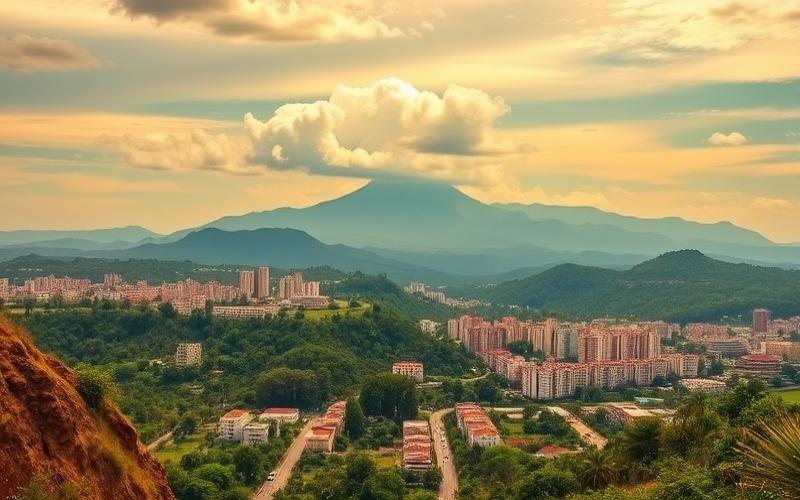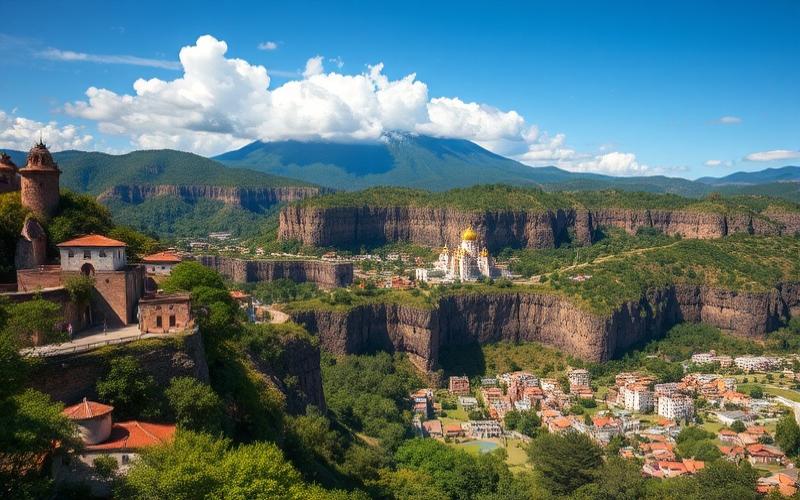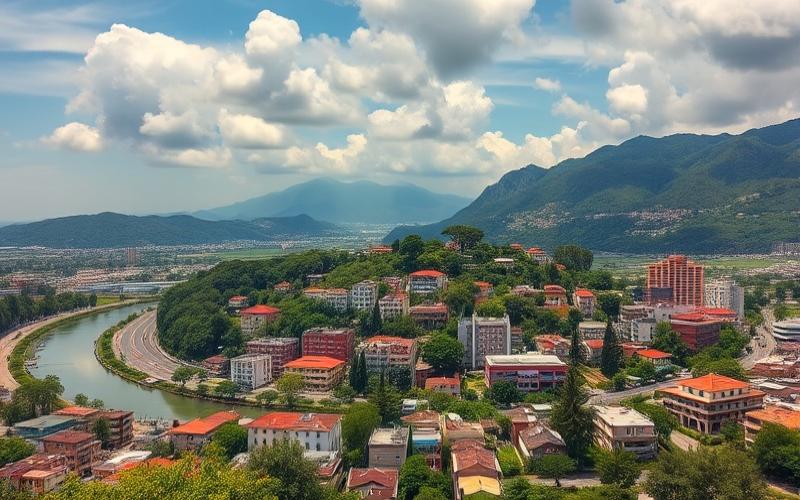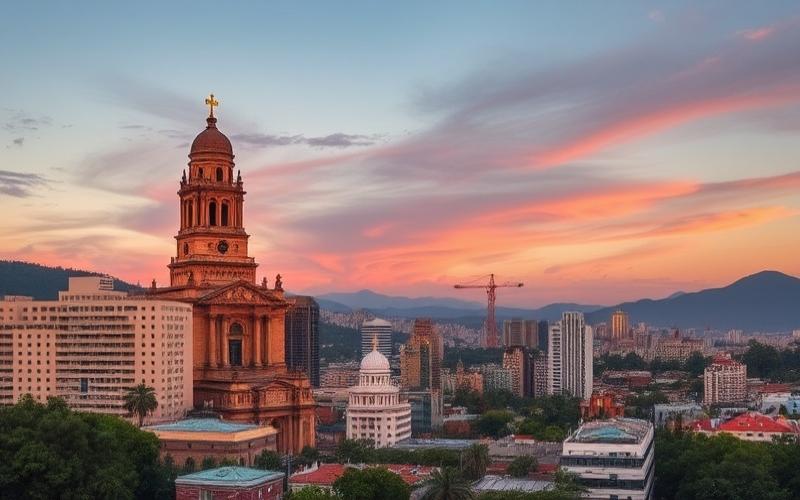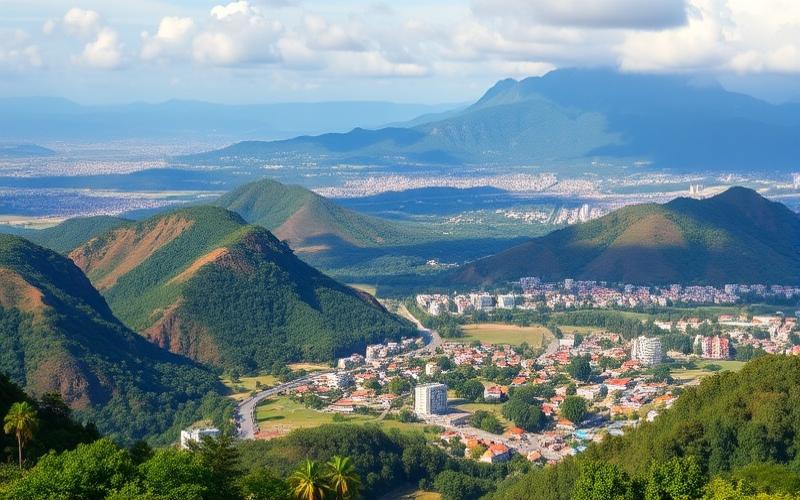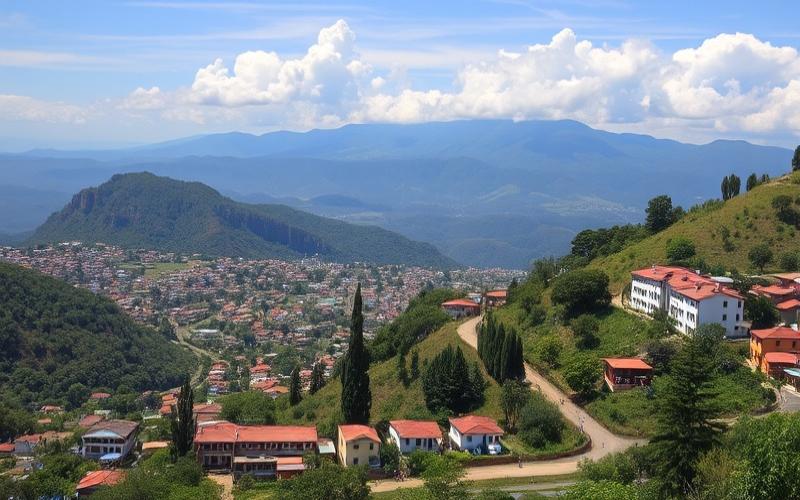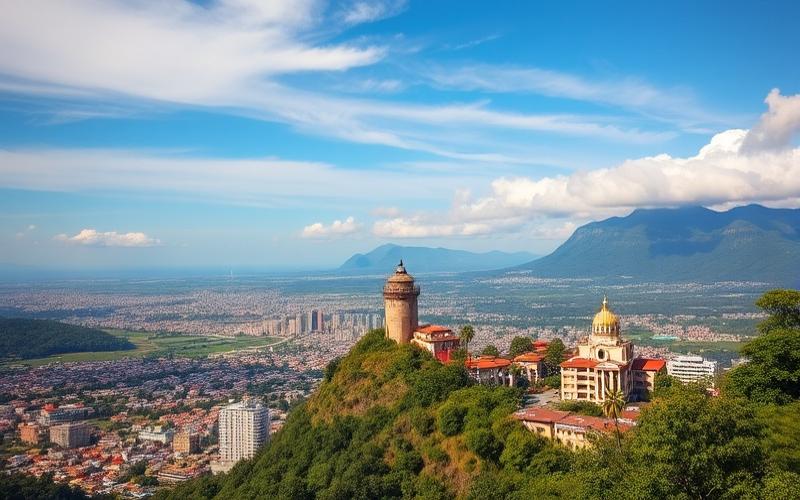
 Published on and written by Cyril Jarnias
Published on and written by Cyril Jarnias
Choosing to relocate to El Salvador, a small Central American country, may seem like a bold decision, given its wealth of fascinating contrasts. With its spectacular volcanic landscapes and rich culture, El Salvador offers unique perspectives for those seeking to explore new territories.
However, it’s important to carefully weigh the potential advantages and disadvantages of such a move, because while the country is attracting more and more expatriates seeking new financial opportunities, particularly through the adoption of Bitcoin as legal tender, it also presents challenges in terms of security and access to infrastructure.
Discover the multiple facets of successful expatriation in El Salvador, where every day is a new adventure.
Exploring El Salvador’s Economic Strengths
Key Economic Strengths for Expatriates in El Salvador
- Strong economic growth: GDP is projected to grow between 3% and 3.5% in 2024, supported by domestic consumption, lower inflation (around 0.9%), and investment momentum, particularly in public works and infrastructure.
- Enhanced security: The security transformation since 2022 has significantly reduced crime, boosting the country’s appeal to investors and expatriates.
- Favorable taxation: Elimination of investment tax, territorial tax system, tax incentives in free zones, and benefits for foreign investors.
Growing Economic Sectors
- Tourism:
- Contributes 8% to GDP.
- In 2024, 3.9 million visitors (+17% compared to 2023), driven by improved security and international promotion.
- Agriculture:
- Export of coffee, sugar, and traditional agricultural products.
- Sector supported by modernization initiatives and access to American markets.
- Information Technology:
- Growth in the ICT sector and electrical industry, particularly due to foreign capital inflows (over $57 million USD invested in information and communication in 2023).
- Transportation and Infrastructure:
- Sector that attracted $285.4 million USD in foreign investment in 2023 (+37.6%).
- Development of ambitious infrastructure projects (roads, logistics, water, energy) through public-private partnerships (PPP).
Government Initiatives and Incentives
- Public-private partnerships (PPP) for infrastructure development.
- Nine free trade zones and export processing zones providing preferential access to the American market.
- Tax benefits for foreign investors and elimination of certain investment taxes.
- Improved security and political stability, conducive to international business establishment.
Bitcoin Adoption and Implications
- El Salvador is the first country to adopt Bitcoin as legal tender, alongside the US dollar.
- This innovation aims to attract entrepreneurs and investors in cryptocurrency and fintech, with tax advantages for digital asset-related activities.
- The country aims to become a tax-free crypto haven, facilitating international operations, asset protection, and investment migration.
- Bitcoin adoption has drawn attention from the IMF and international regulators but strengthens the country’s image as a financial innovation hub.
Natural Resources and Workforce
- Natural resources: fertile agriculture, hydroelectric potential, access to the Pacific Ocean for logistics and trade.
- Workforce: young population, competitive costs, strong diaspora contributing to the economy through remittances (20% of GDP in 2023).
- Availability of professional and legal services, welcoming ecosystem for international residents.
Infrastructure Development Potential
Major projects in road networks, airports, energy, logistics, water and sanitation, supported by public-private partnerships and international funding (United States, China).
Objective: strengthen the country’s connectivity and appeal for businesses and expatriates.
Recent Economic Statistics and Projections
| Indicator | 2023 | 2024 (projection) |
|---|---|---|
| GDP Growth | 2.7% | 3% – 3.5% |
| Average Inflation | 0.9% | ~0.9% |
| Net FDI | $759 M USD | +$322 M USD (Q1 2025) |
| Tourism (visitors) | 3.3 M | 3.9 M (+17%) |
| Remittances (diaspora) | $8.1 B USD (+4.6%) | – |
| Textile Exports | 31% of exports | -10% (2024) |
| Transportation Investments | $285.4 M USD | +37.6% (2023) |
Major Reasons for Expatriation to El Salvador
- Opportunities in growing sectors (tourism, agriculture, ICT, infrastructure).
- Attractive tax regime and favorable legal environment.
- Enhanced security and political stability.
- Potential in cryptocurrencies and financial innovation.
- Competitive cost of living, pleasant climate, and international accessibility.
Good to Know:
El Salvador attracts expatriates through a booming tourism sector, supported by tax incentives for foreign investors, and the adoption of Bitcoin as legal tender, though this involves economic risks. The country also focuses on developing information technology, with an available workforce and growing potential in agriculture, supported by infrastructure investments.
Challenges and Cultural Riches to Discover
Cultural and Social Challenges for Expatriates in El Salvador
- Language adaptation: With Spanish as the official language, proficiency is essential for integration and accessing most services. Tailored courses are offered in language schools and cultural centers; language exchanges also facilitate learning by interacting with Salvadorans.
- Differences in daily customs:
- Politeness, discretion, and respect are particularly valued.
- Greetings are warm (handshake, hug) and it’s common to take time to chat with neighbors and colleagues.
- Salvadorans prioritize listening and avoid direct confrontation, especially on sensitive topics (politics, religion).
- Frequent cultural shocks:
- More flexible approach to time (relative punctuality).
- Significant role of Catholic religion in public and private life.
- Often traditional family roles, with strong attachment to family dynamics.
- Political and economic tensions:
- The country has experienced strong political polarization, inherited from the civil war, which persists in public debate.
- Society remains marked by socioeconomic disparities and dependence on diaspora financial transfers.
- Security concerns remain, even though the situation has improved in recent years.
| Cultural or Social Challenge | Recommended Adaptation Strategy |
|---|---|
| Language Adaptation | Participate in Spanish classes, language exchanges |
| Punctuality and Time Perception | Show patience, flexibility |
| Indirect Communication | Prioritize listening, avoid confrontation |
| Religion and Traditions | Respect local practices, even without adhering to them |
| Family Roles | Observe, adapt without judgment |
Cultural Riches and Learning Opportunities
- Discovery of local traditions: Expatriates can immerse themselves in community life through patron saint festivals, religious processions, and festivals like Fiestas Agostinas.
- Salvadoran cuisine:
- Iconic specialties like pupusas (stuffed corn cakes), tamales, fried yuca, or Salvadoran ceviche.
- Shared meals are key moments for building relationships and discovering local conviviality.
- Historical heritage:
- Presence of pre-Columbian archaeological sites, colonial heritage visible in architecture and churches.
- Blend of Amerindian and Spanish traditions creating a unique cultural identity.
- Festivals and Cultural Events:
- Numerous festivals, carnivals, and religious celebrations throughout the year, where foreign participation is often encouraged.
- Craft workshops, sports activities, and community events open to newcomers.
- Intercultural Sharing Opportunities:
- Expatriates can share their own culture through language exchanges, workshops, or multicultural events.
- Engagement in associations, volunteer projects, or local initiatives promotes mutual learning.
Examples of Enriching Experiences Lived by Expatriates
- Participation in collective pupusa preparation during festivals, fostering neighborhood integration.
- Joining a local sports team to quickly build connections, even without perfect language mastery.
- Discovery of the richness of religious syncretism and local celebrations, sources of wonder and openness.
Practical Tips to Fully Enjoy the Cultural Experience
- Accept invitations to share a meal or attend a family celebration.
- Show curiosity, ask questions about traditions and culinary specialties.
- Use local apps to identify nearby cultural events and activities.
- Join expatriate groups to benefit from their network and share experiences.
Key Points to Remember
Expatriation to El Salvador presents challenges but offers genuine opportunities for personal enrichment and intercultural exchanges.
Patience, open-mindedness, and willingness to engage in local life are essential to transform these challenges into human and cultural riches.
Good to Know:
Adapt to cultural differences, such as daily customs and language, while enjoying riches like historical heritage and local cuisine. Be aware of political tensions that can sometimes influence daily life, but discover opportunities for enriching intercultural learning.
Personal Impact and Inner Transformation
Relocating to El Salvador involves profound personal changes, triggered by daily confrontation with a different culture and new social references. This transformation process manifests through several dimensions.
Personal Changes and Enrichment:
- Discovery of new ways of thinking and acting that invite questioning one’s own values and habits.
- Adaptation to a distinct pace of life, priorities, and social codes, which can strengthen open-mindedness.
- Learning Spanish, often necessary for integration, which stimulates cognitive plasticity and adaptability.
- Development of greater tolerance for uncertainty and the unexpected, as daily life involves novel and sometimes destabilizing situations.
Adaptation Challenges:
- Difficulty mastering the Spanish language, essential for accessing employment, services, or citizenship.
- Adjustment to social norms, sometimes distant from those of the home country (hierarchical relationships, time management, communication styles).
- Need to create a new social network, which can generate feelings of isolation, especially during the first months.
- Managing distance from family and friends remaining in the home country.
Examples of Positive Transformations Experienced by Expatriates:
| Transformation | Example Experienced by Expatriates |
|---|---|
| Increased Resilience | Learning to manage complex administrative procedures or unexpected daily life events. |
| Tolerance for Uncertainty | Accepting not understanding everything immediately, operating in a temporary discomfort zone. |
| Respect for Diversity | Developing genuine curiosity for Salvadoran history, culture, and traditions. |
| Resourcefulness | Finding creative solutions to novel situations (e.g., finding housing, understanding the healthcare system). |
Less Positive Aspects and Their Impact on Personal Evolution:
- Feelings of isolation can arise, especially if language or cultural barriers are significant.
- Integration difficulties can lead to discouragement or retreat into the expatriate community, hindering desired openness and transformation.
- Some expatriates sometimes experience identity loss or discomfort with the need for deep adaptation, which can lead to personal questioning.
Factors Facilitating Integration and Transformation:
- Participation in local groups, community activities, or expatriate forums.
- Taking language courses and active immersion in Salvadoran daily life.
- Developing an attitude of listening and respect towards cultural differences.
Expatriation to El Salvador, beyond administrative procedures, involves an inner journey of discoveries, questioning, and personal enrichment, but also challenges that shape personality and worldview.
Good to Know:
Relocating to El Salvador can profoundly transform your perspectives, making you more resilient in facing cultural and linguistic adaptation challenges, although the risk of isolation can prove difficult to overcome. Many expatriates report increased openness to diversity but emphasize the importance of creating a local network to facilitate integration and enrich your personal experience.
Disclaimer: The information provided on this website is for informational purposes only and does not constitute financial, legal, or professional advice. We encourage you to consult qualified experts before making any investment, real estate, or expatriation decisions. Although we strive to maintain up-to-date and accurate information, we do not guarantee the completeness, accuracy, or timeliness of the proposed content. As investment and expatriation involve risks, we disclaim any liability for potential losses or damages arising from the use of this site. Your use of this site confirms your acceptance of these terms and your understanding of the associated risks.


